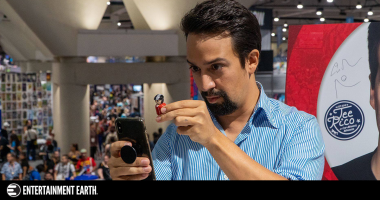In this episode of Plastic Soul, the Entertainment Earth Pop Culture Show, Tom Kenny sits down with host Jason Lenzi at the #SDCC2023 booth to discuss being a comedian, his most famous roles, and collectibles (obviously)! Check out their conversation now!
Tom: Hey I’m Tom Kenny, cartoon voice guy, and what are you watching? Plastic Soul on the Entertainment Earth YouTube channel!
Jason: Here we are again, Comic-Con, San Diego 2023, the Entertainment Earth Booth, Plastic Soul, we are here with the legendary Tom Kenny, how are you, Tom
Tom: I’m doing great, I’m doing great, Plastic Soul, I love plastic, I love Soul music, we’re good
Jason: Beautiful so um, I want to know [MUMBLED] or cartoon voices, which came first?
Tom: Wow you know, all kind of around the same time, you know, I loved animation, I loved the cartoons that I saw on TV, I was obsessive. I wanted to – even then pre-internet days by about 50 years – wanted to find out who did the voices and everything, but I also got very into comic books and different uh comic book artists and then because of the Nostalgia Boom that was going on around that time they were reprinting a lot of old newspaper strips, you know, bound collection of newspaper strips from the 20s 30s 40s and I got really into that as a kid and then I got really into, you know, music and rock and roll and like old-old-rock and roll music, you know, which I’m still into so and that’s all all the stuff that I love back then, I said it’s the worst case of Arrested Development of all time, Jason, I’m telling you.
Jason: There is a theme with everyone I’ve spoken to, Todd McFarland, DMC, the same thing – that the stuff you loved when you were young feeds into everything you’ve done in your career, basically
Tom: It awakened something in you, and, you know, some people never find that thing
Jason: True
Tom: Some people aren’t into anything, you go “what do you like?” and they go “nah, nothing.” You walk into somebody’s house and you’re going “I can’t see any evidence of anything they like!” like just bland, no personality. And I’m into too much, you know, but it’s like, you were talking about those guys, and about us, that that stuff that blows your mind when you’re at a tender age just kind of stays with you and, you know, when you make a living, if you’re lucky enough to make a living you know, monetizing those interests, which, you know, we’ve been lucky with that, you know, you just keep on loving it. That is a through line with with all these people, and I just love, you know… that stuff is just – it’s got power, you know, it’s got emotional power. And if you’re lucky enough, you get to get on, you know, you get in projects where the stuff you’re working on becomes somebody’s mind – childhood mind-blowing thing, that hopefully maybe drives them to a career that they don’t hate, you know, and it’s like “Wow cool!
Jason: “It’s like if you went back and told the kid you, “hey one day…” and you’d kind of go “get out of here!”
Tom: Did you know Jason, this has been happening since the pandemic, you know, uh ended, and, you know, one thing we found out about during the pandemic was that virtually any place can be a voice-over booth, right! I thought I could never leave LA, I never took vacations I’m like I don’t want them to forget about me, you know, freelance, mental illness, but so when I go home to see my mom, which I just did, she still lives in a house, and me and my brothers and sisters all were born and grew up in in Syracuse New York, 94 years old, the de facto booth that my wife and I, also a voice-over person, that my wife and I set up in – is in the childhood closet of my childhood bedroom and I’m like, “wow!” This is where I used to, like, daydream about being Mel Blanc! You know, like, well what would it be like, I mean you know, I used to think about all that stuff in that bedroom and go, “wow could a grown-up have that job?” I don’t know, nobody in Syracuse could tell me so.
Jason: Yeah, that’s another thing you’re kind of… you’re… a lot of this is you’re going without a net, you know, everything we try to do, there’s no- there’s no college course or Learning Annex thing that says this is how it’s going to go, you have to have the hutzpah and the confidence, which is weird because that’s what I’m getting to, is where did McFarland, again these guys, where does the confidence come from? We, you know, it’s feast or famine, or it was, you know, it can be for people that, you know, it’s going to click that you’re confident enough to know, “I dig this stuff, I can do this stuff,” how do you know, when do you kind of, when does it click?”
Tom: Some of it may be naivete more than confidence, but I like, I never thought of myself as a confident person really, or definitely not a confident kid, um, but you know, I was never like “oh, I’ve got that now.” I’m a little more like that after 50 years of figuring stuff out you go, “maybe I don’t suck at figuring stuff out” bu,t I uh yeah, I never was that confident but I guess I must have had some level of confidence because I went for it, I kept at it, yeah I graduated high school and said I’m going to move to Boston and try to be a stand-up comedian, what’s the worst that can happen? So you know, um, Van Partible, that I was talking to, they created the Johnny Bravo TV show for Cartoon Network, he said the thing that we all have in common is that we ask her, or you see somebody doing something, you go, “why not me?” Yeah, somebody else is doing that, “why not me?” Now, what I said to him was, I said, “Well there’s often no shortage of people standing around you going, “well, here’s why not you.” Yeah, here’s why you can’t do that, you know, and whatever, it’s people from your hometown or naysayers or sometimes it’s people that actually have your best interests at heart, and they don’t want to see you get… broken, and get your heart broken, and um, but you know, we did it. I mean I was lucky enough to have a best friend my whole life, since I was six years old, uh, Bobcat Goldthwait, the comedian-director, and him and I grew up together in Syracuse we met in first grade and he, he was a very confident person and he kind of pushed me into confidence. He was kind of my Jiminy Cricket, “you can do this Pinocchio!” You know, yeah he pushed so, I really- I really have him to thank more than anybody, you know, I’m eternally grateful to him because he was like, “you’re funny!” I’m like, “I just want to write jokes for you.” You know, people say, “you must have been the class clown, I say, “no, I was the class clowns writer!” Bobcat was the class clown, I was the class clown’s head writer, behind the scenes, and I kind of liked being behind the scenes.
Jason: I have a theory, too, about the stage personas and being a stand-up and how well it informs other performance acting, uh, you know, voice-over, etc. Would you say that – I have a theory about stand-ups being great with their voices, it lends itself to to voice-over.
Tom: Yeah, especially if you have the kind of stand-up where you do characters, and you do, which I always did -I never did celebrity impressions, but I always did people I knew, and my uncles, and some guy that I met on the bus, or this lady that I saw walking down the street today, I would do characters that way which my mom did too and still does at 94. She’ll do impressions of all the neighbors they’re hilarious you know and um, yeah, so… and really when you’re doing stand-up the persona that you choose is usually a tweaked version of who you are. You know, Bobcat was a little crazy, bull-in-a-china-shop kinda guy, but he made himself a big crazy bull-in-a-china-shop guy. You know, I was like a nervous hyperactive guy with a lot of nervous energy, I made myself a REALLY nervous, really hyperactive guy with a lot of nervous energy when I would do stand-up. Just cranked it up and, um, yeah a lot of stand-up comedians are great character actors you know sometimes they’re not the most collaborative people, because stand-up is such an autonomous-
Jason: Solo experience
Tom: Yes exactly right, and so I always liked playing with others, you know, a lot of uh a lot of stand-ups just can’t do that, because they write it, they say it, they’re in charge of everything, they edit their specials, you know so sometimes they’re not great actors when they have to interact with other people but they’re usually keen observers, so if you can marry that keen observation uh uh skill to uh, you know, to being collaborative playing, well, with others.
Jason: The minutia in the voice, when you, little turns here, yeah I think lends itself to when you’re in the booth
Tom: Yeah accents, you know, wow, there’s a you know a lot of it is mashups, Jason, you know, like, you’ll go “okay, oh there’s this guy, and that guy, and I’ll put in a little bit of that guy from that old movie…” and you kind of mix them all together and it turns into something, you know, it’s kind of just you know, just mixing it up.
Jason: You brought a lot of joy to a lot of people, you still are!










